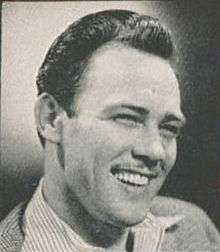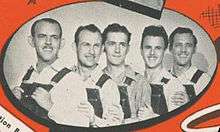Hank Penny
| Hank Penny | |
|---|---|
 | |
| Born |
September 18, 1918 Birmingham, Alabama |
| Died |
April 17, 1992 (aged 73) California |
Herbert Clayton Penny (September 18, 1918 – April 17, 1992) was an accomplished banjo player and practitioner of Western swing.[1] He worked as a comedian best known for his backwoods character "That Plain Ol' Country Boy" on TV with Spade Cooley. He was married to country singer Sue Thompson from 1953-63.
Penny was the leader of the Radio Cowboys, which featured guitarist Julian Akins, steel guitarist Sammy Forsmark, tenor banjo player Louis Damont, bassist Carl Stewart, and vocalist, guitarist, and fiddler Sheldon Bennett in the 1930s. At WLW Radio in Cincinnati during World War II, Penny formed the Plantation Boys, which included fiddler Carl Stewart, guitarist/bassist Louis Innis, fiddler Zed Tennis, and lead guitarist Roy Lanham. Penny left Cincinnati for Los Angeles in 1944, where he formed larger Western swing bands that played local clubs and ballrooms like Venice Pier in Santa Monica. Among the musicians who worked with him in his early years in California were former Texas Playboys Noel Boggs on steel guitar and guitarist Jimmy Wyble. Penny later took over a band formerly led by ex-Spade Cooley bassist Deuce Spriggens. Penny modeled his band and repretoire of Western Swing music from Milton Brown and his Musical Brownies and Bob Wills and his Texas Playboys.
Penny had three hits on the Billboard Country Singles chart, "Steel Guitar Stomp" (1946) an instrumental featuring both Noel Boggs on steel guitar and guitarist Merle Travis, who produced the recording, the slightly risque' "Get Yourself a Red Head" (1946), and his own composition "Bloodshot Eyes" (1950).
Bloodshot Eyes
Penny's "Bloodshot Eyes," originally a country novelty number. was also recorded in 1951 by rhythm and blues singer Wynonie Harris, who recorded for King Records, Penny's label at the time. It became an R&B hit (King 4461). Penny himself had little influence on rock and roll, and the reason Harris recorded the song was because the publishing was owned by King, whose owner Syd Nathan encouraged other artists to record songs he published. It had nothing to do with racial integration. It was strictly business. Harris's version of "Bloodshot" was appreciated in the Caribbean, where Wynonie Harris had a large following. Along with other Wynonie Harris records, it was being played on Jamaican dancehalls as early as 1951. In 1958 Jamaican mento group Denzil Laing and the Wrigglers recorded a fine version of it for their Arawak Hotel album featuring jazz guitar great Ernest Ranglin. Bermuda Islands legend Sydney Bean also recorded it, releasing it circa 1955. In 1971, the song was a top-40 regional hit in Detroit, recorded by Lucifer on the Holland/Dozier/Holland-owned Invictus Records label.
Jazz
A lifelong fan of jazz, Penny recorded "Hillbilly Be-Bop" for King Records in 1949. It was one of the first western swing numbers to incorporate the then-modern jazz style known as bebop. His various bands included jazz oriented sidemen including guitarists Jimmy Wyble and Benny Garcia. For a time in 1950 singer Jaye P. Morgan was part of his larger band known as the Penny Serenaders.
Along with Amand Gautier, Penny co-founded the Palomino Club in Hollywood in 1949. The club was open seven days a week, and on Monday nights, after the closing time, it was "open stage" to some of the most famous jazz musicians in the country.
Penny was known for his unwillingness to compromise and his sometimes-combative attitude. He walked out on a 1945 engagement at Venice Pier when dance promoter Bert "Foreman" Phillips insisted Penny direct his musicians to quit playing improvisational jazz solos and stick to melodic instrumental passages in the style of conventional country singers like Ernest Tubb. When Phillips demanded Penny fire Wyble, Boggs and fiddler Harold Hensley for continuing to improvise, Penny dissolved the band. He was also known to stand up to promoters and to King Records president Syd Nathan, notorious for bullying and exploiting his artists.
Penny's recordings for King included some of the finest musicians in western music, such as guitarists Wyble, Roy Lanham and Benny Garcia, fiddlers Harold Hensley, Max Fidler and Billy Hill and steel guitarists Noel Boggs, Earl "Joaquin" Murphey, Speedy West and Wayne Burdick. Many of Penny's sidemen also worked with Spade Cooley. For several years, starting in 1948, Penny was a member of the cast of Cooley's Saturday night TV show over KTLA in his guise as a country comedian, and seldom performed music.
In 1952, Penny began hosting his own local Los Angeles TV series, The Hank Penny Show, which was canceled after only seven weeks.
By 1954, Penny moved to Las Vegas, where he began a seven-year run as a performer at the Golden Nugget casino, fronting a band that included steel guitar virtuoso Curly Chalker and at the same time, Roy Clark, whose own comedy delivery was influenced considerably by Penny's onstage comic timing. Penny's band backed Clark on his first album for Capitol Records.
Penny made a 1970s appearance with Peggy Conner on America 2-Night, playing a country husband-and-wife singing duo called Buck and Harriet Pine.
Biography

Penny was born in Birmingham, Alabama. He died in 1992 of heart failure.[1] He was the father of actress Sydney Penny and producer Greg Penny. Country music historian Rich Kienzle began researching and writing about Penny's career in the late 1970s and devoted an entire chapter to him in his 2003 book "Southwest Shuffle."
External links
- http://www.seattlewesternswingmusicsociety.com/hankpenny.htm
- http://rcs-discography.com/rcs/artists/p/penn6500.htm
Notes
- 1 2 Ankeny, Jason. "Hank Penny: Biography". AllMusic. Retrieved 2011-02-06.